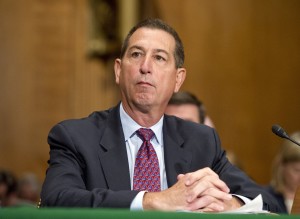The U.S. Office of the Comptroller of the Currency announced yesterday that it would begin accepting applications for national bank charters from fintech companies, a move that could streamline the regulatory process for innovators in the banking space.
The proposal, which was first made under former Comptroller Thomas Curry, follows extensive outreach with many stakeholders over a two-year period.
Qualifying fintech companies may also apply for federal charters under the OCC’s authority to charter full-service national banks and other special purpose banks, such as trust banks, banker’s banks and credit card banks.
“The federal banking system must continue to evolve and embrace innovation to meet the changing customer needs and serve as a source of strength for the nation’s economy,” Comptroller of the Currency Joseph M. Otting said in a statement. “The decision to consider applications for special purpose national bank charters from innovative companies helps provide more choices to consumers and businesses, and creates greater opportunity for companies that want to provide banking services in America. Companies that provide banking services in innovative ways deserve the opportunity to pursue that business on a national scale such as a federally chartered, regulated bank.”
The decision by the OCC resulted in swift outrage from other organizations that have been involved in trying to create a regulatory framework for fintech companies.
“An OCC fintech charter is a regulatory train wreck in the making,” John W. Ryan, president and CEO of
the Conference of State Bank Supervisors, said in a statement. “Such a move exceeds the current authority granted by Congress to the OCC. Fintech charter decisions would place the federal government in the business of picking winners and losers in the marketplace. And taxpayers would be exposed to a new risk: failed fintechs.”
The CSBS, a group that supports state regulators in advancing the system of state financial supervision, sued the OCC after they released the proposal for granting national charters to fintechs, but the case was dismissed earlier this year.
Also earlier this year, the CSBS organized a multi-state compact between seven states including Massachusetts, standardizing key elements of the licensing process for money services businesses.
Under the agreement, if one state reviews key elements of state licensing for a money transmitter – IT, cybersecurity, business plan, background check and compliance with the federal Bank Secrecy Act – then other participating states would agree to accept the findings.
The OCC said that a national bank charter is only one option among many – other options include pursuing state banking charters, appropriate business licenses and partnerships with other federal or state financial institutions.
The agency also said fintech companies that apply for and receive special purpose national bank charters will be supervised like similarly situated national banks, and be subject to heightened supervision initially, similar to other de novo banks. That means including capital, liquidity and financial inclusion commitments as appropriate.
Additionally, these companies will be expected to submit an acceptable contingency plan to address significant financial stress that could threaten the viability of the bank. The plan would outline strategies for restoring the bank’s financial strength and options for selling, merging or liquidating the bank in the event the recovery strategies are not effective.
The expectations for promoting financial inclusion will depend on the company’s business model and the types of planned products, services and activities, the OCC said.







